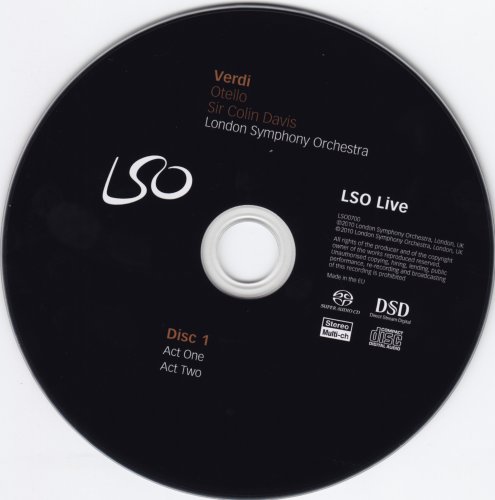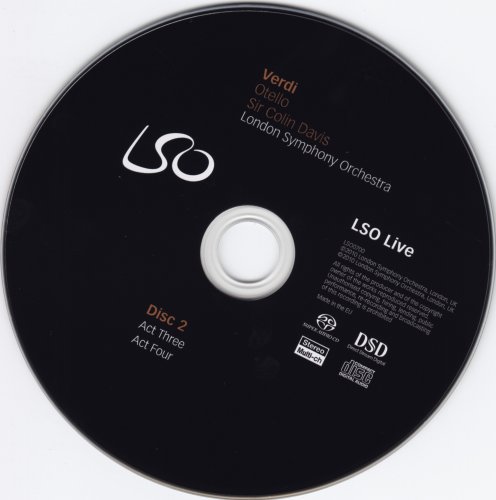
Sir Colin Davis, London Symphonie Orchestra - Verdi: Otello (2010) [SACD]
BAND/ARTIST: Sir Colin Davis, London Symphonie Orchestra
- Title: Verdi: Otello
- Year Of Release: 2010
- Label: LSO Live
- Genre: Opera
- Quality: DSD64 image (*.iso) / 2.0, 5.1 (2,8 MHz/1 Bit)
- Total Time: 01:04:27+01:06:54
- Total Size: 7.52 GB
- WebSite: Album Preview
Tracklist:
Disc 1:
Act 1
1. Storm / Una vela! Una vela! 1:22
2. Esultate 2:12
3. Roderigo, ebben, che pensi 2:26
4. Fuoco di gioia! 2:40
5. Roderigo, beviam 1:32
6. I naffia l’ugola 3:39
7. Capitano, v’attende 0:41
8. Va al porto 3:29
9. Già nella notte densa 9:24
Act 2
10. Prelude / Non ti crucciar 2:57
11. Credo in un Dio crudel 5:38
12. Ciò m’accora 4:13
13. Flower Chorus. Un tal proposto 4:23
14. D’un uom che gemme 2:06
15. Dammi la dolce 4:06
16. Ora e per sempre addio 3:49
17. Era la notte 4:34
18. Si, pel ciel 2:31
Disc 2:
Act 3
1. Prelude 1:13
2. La vedetta del porto 6:08
3. Esterrefatta 5:13
4. Dio! mi potevi scagliar tutti i mali 4:33
5. Vieni, l’aula è deserta 5:00
6. Bada 5:10
7. Messeri! 1:49
8. A terra!… sì 8:04
Act 4
9. Prelude / Era più calmo? 4:38
10. Piangea cantando 6:11
11. Ave Maria 4:15
12. Chi è là? 3:09
13. Diceste questa sera 4:34
14. O mentitrice! 1:43
15. Niun mi tema 5:14
![Sir Colin Davis, London Symphonie Orchestra - Verdi: Otello (2010) [SACD]](https://www.dibpic.com/uploads/posts/2021-06/1623226922_back.jpg)


Disc 1:
Act 1
1. Storm / Una vela! Una vela! 1:22
2. Esultate 2:12
3. Roderigo, ebben, che pensi 2:26
4. Fuoco di gioia! 2:40
5. Roderigo, beviam 1:32
6. I naffia l’ugola 3:39
7. Capitano, v’attende 0:41
8. Va al porto 3:29
9. Già nella notte densa 9:24
Act 2
10. Prelude / Non ti crucciar 2:57
11. Credo in un Dio crudel 5:38
12. Ciò m’accora 4:13
13. Flower Chorus. Un tal proposto 4:23
14. D’un uom che gemme 2:06
15. Dammi la dolce 4:06
16. Ora e per sempre addio 3:49
17. Era la notte 4:34
18. Si, pel ciel 2:31
Disc 2:
Act 3
1. Prelude 1:13
2. La vedetta del porto 6:08
3. Esterrefatta 5:13
4. Dio! mi potevi scagliar tutti i mali 4:33
5. Vieni, l’aula è deserta 5:00
6. Bada 5:10
7. Messeri! 1:49
8. A terra!… sì 8:04
Act 4
9. Prelude / Era più calmo? 4:38
10. Piangea cantando 6:11
11. Ave Maria 4:15
12. Chi è là? 3:09
13. Diceste questa sera 4:34
14. O mentitrice! 1:43
15. Niun mi tema 5:14
Gerald Finley proves a peerless Iago and the LSO have much to be proud of
Shakespeare’s lines about the Pontic and the Propontic come to mind. That juggernaut of a sentence, unstoppable as Othello says is his “compulsive course”, might be taken for the guiding principle behind this reading of the score – first two acts at least.
It is as though the whole of the first act, from the big bang of inception to the resting-place of the Love Duet, is a mechanism of inexorable movement carried forward into the second act and reaching its appointed end in the disintegration of heroism and the strangling of innocence. Colin Davis (like Toscanini in this) follows Verdi without “retiring ebb” and keeps the opera headed “due on” till journey’s end in the dark and stillness of Desdemona’s chamber. It is done largely by the maintenance of a firm beat, rarely giving way, whether to accommodate singers, tradition or personal whim.
Having constructed that justification for it, I have to confess I don’t naturally warm to it. It would be a coarse reduction of finely balanced considerations to say that this is a performance of the head not of the heart, but equally, just as a matter of personal fact, I cannot say that I was moved. And this was not because of a felt lack of commitment on the part of any of the performers. Soloists, chorus and orchestra are well keyed up to let no detail slip and to make all tell in the re-creation of a supreme masterpiece.
Of the three main principals, it is tempting to say that the Iago (as so often in performances of the play) is the dominant figure. Gerald Finley gives a masterly account of the part, his voice seemingly transfigured by the Italian music and language. He is not transparently devilish in characterisation, but neither should he be, and his singing – firm and resonant – is scarcely to be bettered on record. Anne Schwanewilms is well cast, with head-notes in the German tradition. Only a few notes of doubtful intonation limit her complete success. The New Zealander Simon O’Neill is an unusual Otello in that he is so unequivocally a tenor, with no hint of the baritone in his timbre. His voice has a ring to it and his expressiveness, if not yet quite personal enough to be memorable, appears to be directed by feeling and understanding.
The LSO, producing on its own label, has much to be proud of. Its chorus is exceptionally precise and expressive; the playing is alert and sensitive to drama and text. The various elements (including special effects such as the off-stage trumpets in Act 3) are judiciously balanced. And a great conductor adds a great work to his discography. For myself, though, in the first two acts I’m too aware of him and his control. Shakespeare’s Othello would have done much better had his Pontic not kept “due on to the Propontic”; in Verdi’s Otello the “compulsive course” is mapped out with sufficient clarity as not to need quite such a determined fortification of bar-lines.
Shakespeare’s lines about the Pontic and the Propontic come to mind. That juggernaut of a sentence, unstoppable as Othello says is his “compulsive course”, might be taken for the guiding principle behind this reading of the score – first two acts at least.
It is as though the whole of the first act, from the big bang of inception to the resting-place of the Love Duet, is a mechanism of inexorable movement carried forward into the second act and reaching its appointed end in the disintegration of heroism and the strangling of innocence. Colin Davis (like Toscanini in this) follows Verdi without “retiring ebb” and keeps the opera headed “due on” till journey’s end in the dark and stillness of Desdemona’s chamber. It is done largely by the maintenance of a firm beat, rarely giving way, whether to accommodate singers, tradition or personal whim.
Having constructed that justification for it, I have to confess I don’t naturally warm to it. It would be a coarse reduction of finely balanced considerations to say that this is a performance of the head not of the heart, but equally, just as a matter of personal fact, I cannot say that I was moved. And this was not because of a felt lack of commitment on the part of any of the performers. Soloists, chorus and orchestra are well keyed up to let no detail slip and to make all tell in the re-creation of a supreme masterpiece.
Of the three main principals, it is tempting to say that the Iago (as so often in performances of the play) is the dominant figure. Gerald Finley gives a masterly account of the part, his voice seemingly transfigured by the Italian music and language. He is not transparently devilish in characterisation, but neither should he be, and his singing – firm and resonant – is scarcely to be bettered on record. Anne Schwanewilms is well cast, with head-notes in the German tradition. Only a few notes of doubtful intonation limit her complete success. The New Zealander Simon O’Neill is an unusual Otello in that he is so unequivocally a tenor, with no hint of the baritone in his timbre. His voice has a ring to it and his expressiveness, if not yet quite personal enough to be memorable, appears to be directed by feeling and understanding.
The LSO, producing on its own label, has much to be proud of. Its chorus is exceptionally precise and expressive; the playing is alert and sensitive to drama and text. The various elements (including special effects such as the off-stage trumpets in Act 3) are judiciously balanced. And a great conductor adds a great work to his discography. For myself, though, in the first two acts I’m too aware of him and his control. Shakespeare’s Othello would have done much better had his Pontic not kept “due on to the Propontic”; in Verdi’s Otello the “compulsive course” is mapped out with sufficient clarity as not to need quite such a determined fortification of bar-lines.
![Sir Colin Davis, London Symphonie Orchestra - Verdi: Otello (2010) [SACD]](https://www.dibpic.com/uploads/posts/2021-06/1623226922_back.jpg)


Download Link Isra.Cloud
Sir Colin Davis, London Symphonie Orchestra - Verdi: Otello (2010) part1.
Sir Colin Davis, London Symphonie Orchestra - Verdi: Otello (2010) part2.
Sir Colin Davis, London Symphonie Orchestra - Verdi: Otello (2010) part3.
Sir Colin Davis, London Symphonie Orchestra - Verdi: Otello (2010) part4.
My blog
Sir Colin Davis, London Symphonie Orchestra - Verdi: Otello (2010) part1.
Sir Colin Davis, London Symphonie Orchestra - Verdi: Otello (2010) part2.
Sir Colin Davis, London Symphonie Orchestra - Verdi: Otello (2010) part3.
Sir Colin Davis, London Symphonie Orchestra - Verdi: Otello (2010) part4.
My blog
As a ISRA.CLOUD's PREMIUM member you will have the following benefits:
- Unlimited high speed downloads
- Download directly without waiting time
- Unlimited parallel downloads
- Support for download accelerators
- No advertising
- Resume broken downloads


![Sir Colin Davis, London Symphonie Orchestra - Verdi: Otello (2010) [SACD]](https://www.dibpic.com/uploads/posts/2021-06/1623227043_front.jpg)